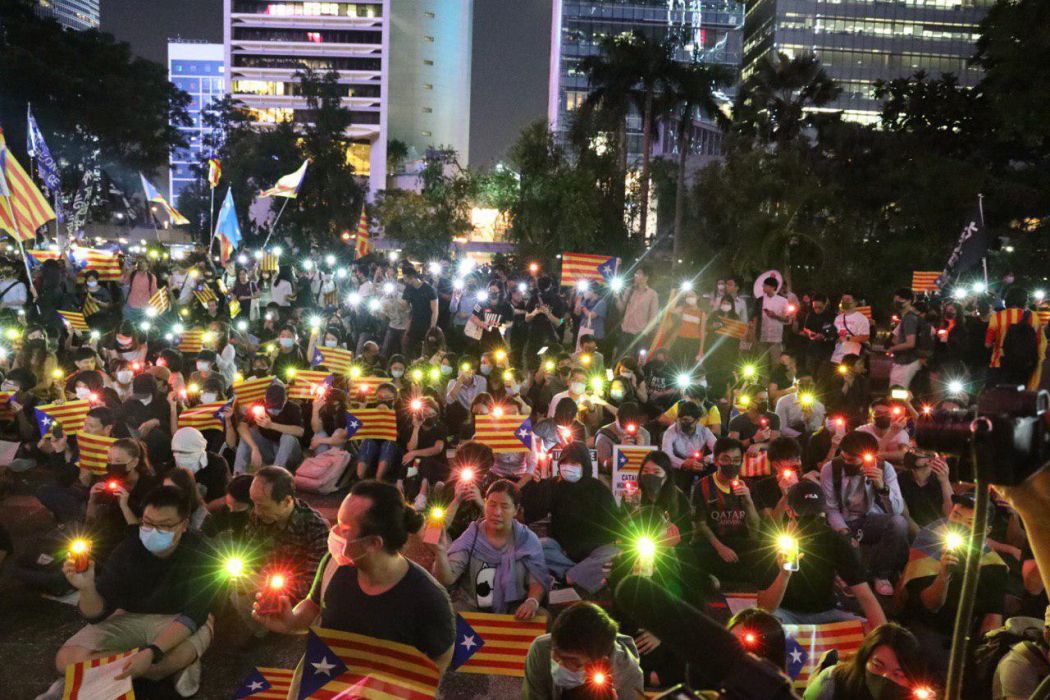There is something distinctly worrying about seeing so many American and British flags at recent democracy protests, although it’s understandable.
The concern is not that these flags inflame the anti-democrats and make them holler about foreign interference in Hong Kong’s internal affairs; it is about the unwarranted confidence many protesters place in the commitment of these two countries to their cause.

The mushrooming congressional support for the new Hong Kong Human Rights and Democracy Act is definitely encouraging, not least because it is one of the few things that feuding Republicans and Democrats can agree on. And Britain’s legislators, especially in the House of Lords, have shown increasing interest in Hong Kong affairs.
But the harsh reality is that neither of these countries is really going to put themselves out on behalf of Hong Kong. The Trump administration, which overnight abandoned Kurdish fighters in Syria who had literally given their lives to support US objectives, is hardly a reliable ally for anyone fighting for democracy overseas.
The British, currently consumed in an endless debate over the fate of Brexit, have a pretty consistent record here of selling out the interests of Hong Kong people in favour of the realpolitik of appeasing the People’s Republic of China.
There is now pressure in the British parliament to give citizenship rights to Hong Kong holders of the largely useless BNO passport, but it can be confidently asserted that this will come to nothing. The pending US legislation – which may or may not get presidential approval – is more significant because it specifically targets members of the elite who in public decry the United States but in private are busy sending their sons and daughters to study there, not to mention shovelling some of their millions stateside.
The act could well make it more difficult for them to maintain this hypocrisy. The move to prevent the export of US anti-riot gear to Hong Kong is also likely to have a more tangible impact.
Therefore the protesters who have been waving flags to show appreciation for America and Britain are not exactly wasting their time but they might like to do so with more circumspection.

When push comes to shove both the American and British governments will barely bat an eyelid when choosing between their global strategic objectives, grabbing business opportunities with China and working to further the interests of the people of Hong Kong.
Anyone who doubts this assertion should consider the Trump administration’s cynical use of the Hong Kong protests as a lever in the Sino-US trade war.
And yet the overwhelming international publicity given to events in Hong Kong and the enormous support that protesters have received from overseas is hardly irrelevant. At the very least it serves as a reminder to the grey men in Beijing that any brutal crackdown in Hong Kong cannot be done in secret and will weigh heavily in undermining China’s ambitions to win friends and allies around the world.
And international solidarity goes both ways. One of the most intriguing things about the current demonstrations is the extent to which they have shrugged off the insularity which often typifies Hong Kong democracy protests. Last Thursday, Hong Kong protesters expressed their solidarity with the Catalan independence movement in Spain. This was reciprocated by a rally in Barcelona supporting the people of Hong Kong.
Hong Kong demonstrators have also been paying more attention to the situation in Tibet and Xinjiang, which had barely registered on the awareness gauge at any time before.

And this awareness of protest movements beyond the borders of the SAR has also led to all manner of demonstrations around the world supporting Hong Kong. The anthem of the Hong Kong protests, “Glory to Hong Kong” has been translated into a great many languages. Check out the Japanese version, it’s really something.

The anti-democrats, whose contempt for the people of Hong Kong leads them to believe that local people are incapable of organising their own protests, seize on the internationalism of the movement as evidence for their half-baked conspiracy theories. They really can’t get their heads around why this is so and therefore fall back on the paranoid worry of being attacked by foreigners.
In Beijing, the words “foreign meddling” seem to accompany practically every condemnation of the protests.

It is, of course a subject that the Chinese Communist Party knows all about. Founded on the ideology of two Germans, initially organised and sustained by the Soviet Union and with an official commitment to “internationalism,” the party has a long history in these matters.
Yet, the bottom line is that the Hong Kong protest movement, just like the Communist revolution, has been fundamentally reliant on its own resources and the support of local people. The international dimension is not to be sniffed at but is, essentially, peripheral.
